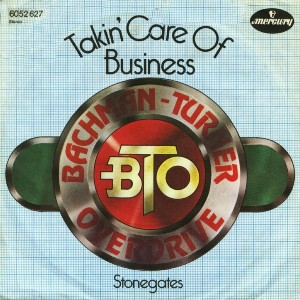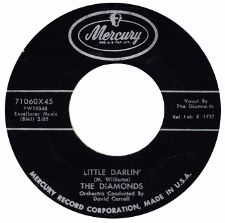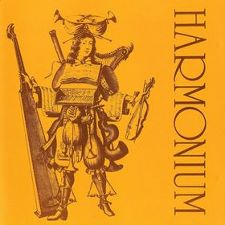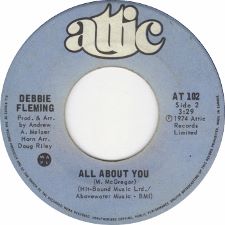| |
Bachman-Turner Overdrive

Takin' Care of Business / Stonegates - 7"
Mercury - 1974
Michael Panontin
|
Randy Bachman quit the Guess Who in May of 1970, just as 'American Woman' was topping the charts on both sides of the 49th. The strait-laced Bachman was at constant odds with his hard-partying bandmates and had had enough. "We had different lifestyles. I didn't party, do drugs, smoke or drink; they all did," he would write in his Vinyl Tap Stories. "I needed to be home with my family for a while."
He wasn't finished with music, however, and soon formed the country-tinged Brave Belt, with original Guess Who singer Chad Allan, bassist and singer Fred Turner, and his brother Robbie Bachman on the skins. But after issuing a couple of middling LPs that barely troubled any charts, it was looking more and more as if Bachman, whose roots with the Guess Who stretched all the way back to 1962 and a band called Allan and the Silvertones, would find himself on a list of all-time missed opportunities along with ex-Beatle Pete Best or one-time Rolling Stone drummer Tony Chapman. Especially since his former mates in the Guess Who would land a good ten singles in the top-twenty in the following three years.
Allan left Brave Belt in 1972. The gruffer-voiced Turner took over on vocals and Bachman's younger brother Tim was added as a second guitarist. With so many siblings in on the act, a name change to Bachman-Turner and then later to Bachman-Turner Overdrive seemed like the obvious thing to do. The new foursome quickly shed their country baggage in favour of a heavier, hard-rocking sound. With the band unceremoniously dropped by their label, Reprise, Bachman began shopping around for a new deal, almost emptying his bank account to finance a demo tape. And after no fewer than 26 rejections - sometimes more than once by the same label - the guys eventually found a home at Mercury Records.
BTO I was issued in May 1973 and contained the perennial crowd-pleaser 'Blue Collar', a departure of sorts from the album's pile-driving rock that would give the talented Bachman something to "stretch out on and play some Lenny Breau/Jeff Beck-style jazzy guitar". BTO I sold well enough, but Charlie Fach, who had originally signed the group that year, kept his eyes on the bottom line and told the boys to come up with more radio-friendly fare. The first single on BTO II, the alternating hard rock/soft rock 'Let It Ride' - to this day one of the band's finest efforts - hit #3 up here in Canuckistan and became their first top-40 hit south of the border.
But it was the record's second single, the classic sing-along 'Takin' Care of Business', that would take BTO into the stratosphere (and no doubt provide Bachman with a lifetime of royalty cheques). Love it or hate it, there is not a single person who lived through the seventies who cannot sing those first few lines by heart: "You get up every morning / From your alarm clock's warning / Take the 8:15 into the city / There's a whistle up above / And people pushin', people shovin' / And the girls who try to look pretty."
As Bachman tells it, 'Takin' Care of Business' was just a reworking of a song he had written way back in '68 with the Guess Who. "When the Guess Who were recording Wheatfield Soul in New York in 1968, we stayed at the Gramercy Hotel and I'd see all these people who worked in New York arriving by train every morning," he recalls. "So I wrote a song called 'White Collar Worker' about all these guys taking the 8:15 into the city every day and going back home at night."
Fast forward a bit and BTO were playing a club in Vancouver. Fred Turner had blown his voice out after a week of three-sets-a-night gigging and handed the mic over to Bachman for the rest of the evening. Desperate for material, Bachman remembered 'White Collar Worker' and quickly simplified the chords for the others to play.
"I [did] it in my head and told the guys to play C Bb and F over and over," he said. "That allowed me to sing the lyrics in a more Chuck Berry way over a simpler chord progression. When we got to the chorus, I just sang 'Takin' care of business' four times over those three same chords. We did another verse and went into the chorus, and out of the blue as the others joined in singing 'Takin' care of business', I just answered each one with 'Every day', 'Every way', 'It's all mine' and 'Working overtime' followed by 'Work out'."
When they had finished, the crowd went wild, clapping, stomping their feet and shouting out the title over and over, so BTO just picked up the tempo and played the song again. They started closing their shows with 'Takin' Care of Business' and by late 1973, BTO entered Kaye-Smith studios in Seattle to record what would be their greatest-selling single ever. It was decided that Bachman would handle the vocals to give Turner a much-needed break during their live performances. But after finishing the recording late one night, there was a knock on the door...and it is here that the story gets kind of weird.
In Vinyl Tap Stories, Bachman readily perpetuates the pizza-guy myth, taking some 350 words to flesh out the story of a 6'4" bearded pizza delivery man who just happened to play piano and who was allowed - almost as if to humour him - one take to add a few riffs to the finished cut of 'Takin' Care of Business'. But in an interview years later at KZOK radio in Seattle, we find out that the pianist, Norman Durkee, was indeed quite tall, but not nearly as tall as Bachman's erroneous tale.
"The thing is," Durkee told KZOK, "Bachman-Turner Overdrive, when I met them, they were across the hall, and they don't get high; they just eat a lot of pizza. And they wanted piano on this song, and I was across the hall doing commercials. And they come in, and one of the engineers says, 'Can you play on this tune?' I says, 'Okay, one time, and then I'm fucking out of here' ['cuz] I had hired like eight or ten people and I [was] paying them by the nanosecond."
Durkee hastily scribbled a few chords down on the back of a pizza box (which is probably where the pizza-guy myth took root) and then proceeded to lay down the piano part in one take. "So we both put on headphones, and then when he wanted me to play, he would point, and when he wanted me to stop, he put his hand across his throat. Anyway, we get through the whole song, and I get up and leave. And he says, 'How do you do that?' And I says, 'I don't know; I've got this magic, man'," with Durkee adding sarcastically, "Sure, I'm the pizza guy. And I play piano."
'Takin' Care of Business' was issued in at least eleven countries, including some beautifully sheathed editions, like the German picture sleeve shown above. It never reached that coveted #1 position, but it did manage an impressive #3 slot on the Canadian RPM chart and a #12 posting on the US Billboard list. Bachman hardly seems worried. For one, he writes, it was a perfect fit for BTO's image..."these big Canadian lumberjack guys who take care of business". But more to the point, "the song has gone way beyond the record charts," he boasts, "and makes more money now than it did back then."
Taking care of business indeed.
|
|
Suggestions

The Diamonds
Little Darlin' / Faithful and True - 7"
Mercury

The Crew-Cuts
Sh-Boom / I Spoke Too Soon - 7"
Mercury

Lisle
Smile with Lisle
Bronco

Harmonium
Harmonium
Celebration

Debbie Fleming
Long Gone / All About You - 7"
Attic
|








